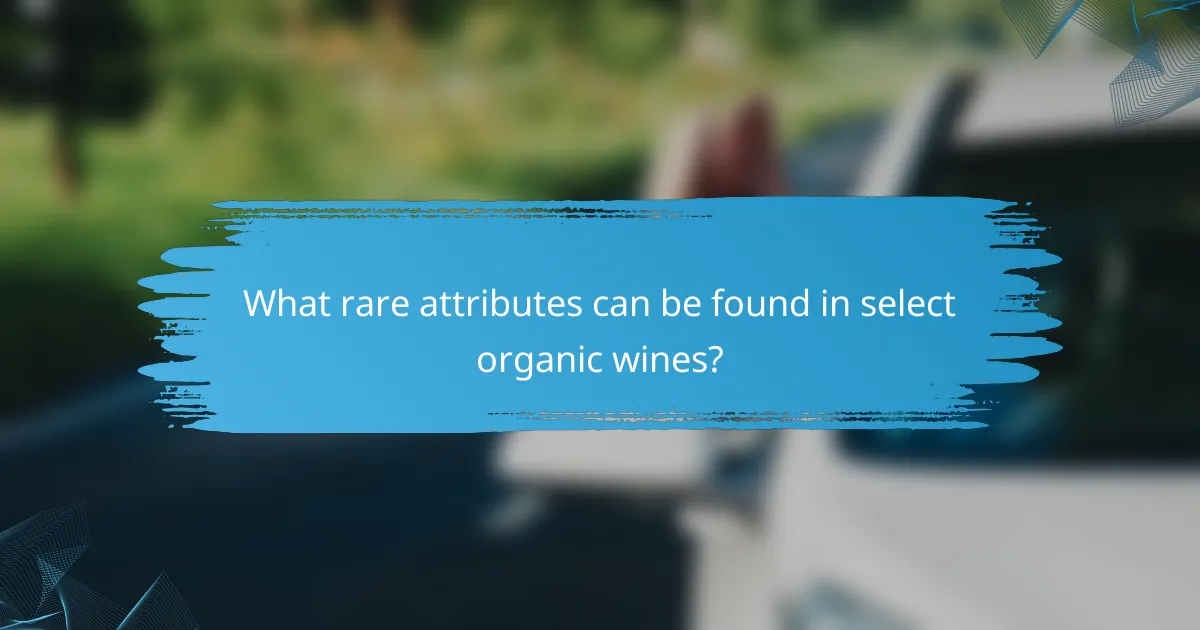Wine tourism enhances eco-friendly practices and supports local economies. It promotes organic wines, showcasing their health benefits and unique terroirs. Local food pairings elevate the tasting experience, fostering connections to regional culture. Sustainable vineyards prioritize biodiversity and ecological balance, appealing to environmentally conscious travelers.

What are the benefits of wine tourism for sustainable vineyards?
Wine tourism benefits sustainable vineyards by promoting eco-friendly practices, enhancing local economies, and fostering community engagement. It encourages the use of organic farming methods, which can increase biodiversity and soil health. Visitors often seek authentic experiences, leading to increased sales of organic wines and local products. This tourism model supports sustainable practices, ensuring vineyards remain viable and environmentally friendly. Additionally, wine tourism can create educational opportunities, raising awareness about sustainable agriculture and conservation efforts.
How do sustainable practices enhance wine quality?
Sustainable practices enhance wine quality by promoting healthier vines and better terroir expression. Organic farming methods reduce chemical inputs, allowing natural soil health to flourish. This leads to grapes with more complex flavors and aromas. Sustainable vineyards often prioritize biodiversity, which can improve pest control and enhance grape quality. As a result, wines from these vineyards typically exhibit greater depth and character, appealing to discerning consumers.
What role does local biodiversity play in sustainable vineyard management?
Local biodiversity enhances sustainable vineyard management by promoting ecological balance, improving soil health, and increasing resilience to pests and diseases. Diverse plant and animal species contribute to natural pest control and pollination, which are vital for grape production. Additionally, maintaining local flora and fauna supports the preservation of unique terroirs, enriching wine quality and fostering a connection to the region. Sustainable practices that protect biodiversity can lead to organic certifications, attracting eco-conscious tourists seeking authentic wine experiences.

Why is organic wine gaining popularity among consumers?
Organic wine is gaining popularity due to its perceived health benefits, environmental sustainability, and support for local economies. Consumers are increasingly aware of the impact of conventional farming practices, driving demand for organic alternatives. Organic wines often reflect the unique terroir of vineyards, enhancing their appeal. Additionally, wine tourism promotes sustainable vineyards, allowing visitors to experience organic wines paired with local cuisine, further enriching the consumer experience.
What are the health benefits associated with organic wines?
Organic wines offer several health benefits, including lower sulfite levels, higher antioxidant content, and potential cardiovascular advantages. These wines are produced without synthetic pesticides or fertilizers, promoting better overall health. Additionally, organic wines may enhance gut health due to their natural fermentation processes. Studies suggest that moderate consumption can contribute to improved heart health and reduced risk of certain diseases.
How do regulations differ for organic wine production across regions?
Regulations for organic wine production vary significantly across regions. In the European Union, strict guidelines govern organic certification, focusing on sustainable farming practices. In contrast, the United States has a comprehensive but less stringent framework, allowing for certain synthetic substances. Australia emphasizes environmental stewardship, requiring organic vineyards to adhere to specific soil and pest management practices. Each region’s regulations reflect its unique agricultural priorities and consumer expectations.

How can local food pairings enhance the wine tasting experience?
Local food pairings significantly enhance the wine tasting experience by creating complementary flavors. They elevate the overall enjoyment of both the wine and the food, allowing for a deeper appreciation of their unique qualities. Pairing local cuisine with organic wines promotes sustainability, supporting regional producers and reducing carbon footprints. For example, a local cheese can highlight the fruity notes of a nearby vineyard’s Chardonnay. This synergy not only enriches the palate but also fosters a stronger connection to the local culture and environment.
Which regional dishes complement specific wine varieties?
Regional dishes that complement specific wine varieties enhance the overall tasting experience. For instance, a rich Cabernet Sauvignon pairs well with grilled red meats, while a crisp Sauvignon Blanc complements fresh seafood. Regional specialties, like Italian risotto, harmonize beautifully with local Chianti. In contrast, a spicy Syrah finds its match in barbecue dishes, showcasing the interplay between food and wine. Understanding these pairings elevates wine tourism by promoting local cuisine and sustainable vineyards.
What are the best practices for pairing wine with local cuisine?
The best practices for pairing wine with local cuisine include considering the regional flavors, matching acidity levels, and balancing body and weight. Emphasizing local varietals enhances the dining experience and supports sustainable vineyards. For example, a light-bodied white wine pairs well with seafood dishes, while a full-bodied red complements hearty meats. Understanding these principles elevates both the wine and culinary experience.

What unique attributes distinguish sustainable vineyards from conventional ones?
Sustainable vineyards prioritize ecological balance, biodiversity, and soil health, distinguishing them from conventional vineyards. They often utilize organic farming practices, which enhance grape quality and reduce chemical input. Additionally, sustainable vineyards may implement water conservation techniques and renewable energy sources, setting them apart in environmental stewardship. These unique attributes foster a more holistic approach to winemaking, appealing to environmentally conscious consumers.
How do consumer preferences shape vineyard sustainability practices?
Consumer preferences significantly influence vineyard sustainability practices by driving demand for organic wines and eco-friendly methods. As consumers increasingly prioritize environmental responsibility, vineyards adopt practices like organic farming and sustainable water management. This shift not only enhances the quality of wines but also aligns with the values of eco-conscious tourists seeking authentic experiences. Local pairings of organic wines with regional cuisine further promote sustainability by supporting local economies and reducing carbon footprints. The integration of consumer preferences into vineyard operations fosters a cycle of sustainability that benefits both producers and consumers.
What innovative technologies are being used in sustainable winemaking?
Innovative technologies in sustainable winemaking include precision viticulture, which utilizes drones and sensors for monitoring vineyard health. These tools enhance resource management and reduce waste. Additionally, solar energy is increasingly used in production facilities, promoting eco-friendly operations. Biotechnological advancements, such as yeast strains tailored for organic fermentation, improve wine quality while minimizing chemical inputs.

What rare attributes can be found in select organic wines?
Rare attributes in select organic wines include unique terroirs, indigenous grape varieties, biodynamic farming practices, limited production runs, and natural fermentation methods. These traits enhance flavor profiles and reflect the specific environmental conditions of the vineyard.
How do vintage variations affect organic wine characteristics?
Vintage variations significantly influence organic wine characteristics by affecting flavor profiles, acidity levels, and aroma complexity. Climate conditions, such as temperature and rainfall during the growing season, directly impact grape development. For example, warmer vintages may produce riper, fruitier wines, while cooler years can enhance acidity and freshness. Organic practices, which emphasize soil health and biodiversity, further interact with these vintage effects, leading to unique expressions of terroir. This interplay results in wines that reflect both their environmental conditions and sustainable farming methods.
What limited-edition organic wines are worth exploring?
Some limited-edition organic wines worth exploring include those from small, sustainable vineyards that prioritize unique terroir. For instance, the “Organic Reserve” from a Napa Valley vineyard showcases a distinct flavor profile with notes of dark fruit and spice. Another example is the “Wild Ferment” series from a Sonoma winery, known for its natural fermentation process that enhances complexity. Lastly, the “Heritage Blend” from a boutique winery in Oregon stands out for its rare varietals and limited production. These wines reflect a commitment to organic practices and offer a unique tasting experience.

How can travelers find the best wine tourism experiences?
Travelers can find the best wine tourism experiences by researching sustainable vineyards, organic wines, and local pairings. Visit regions known for eco-friendly practices, such as Napa Valley or Bordeaux. Look for wineries that offer guided tours showcasing their sustainable methods and organic production. Engage with local experts through tasting events that highlight regional pairings. Check reviews and recommendations on travel forums to discover hidden gems that prioritize sustainability.
What tips can enhance a wine tourism itinerary?
To enhance a wine tourism itinerary, focus on local organic vineyards, unique wine pairings, and sustainable practices. Prioritize visits to wineries that emphasize eco-friendly methods and offer tastings of organic wines. Engage with local chefs for food pairings that complement the wines, creating a holistic experience. Explore vineyard tours that educate on sustainable farming and wine production, enriching your understanding of the region’s offerings. Consider seasonal events or festivals that celebrate local wine culture for added enjoyment.
What common mistakes should wine tourists avoid?
Wine tourists should avoid common mistakes like rushing tastings, neglecting local pairings, and overlooking sustainable practices. These errors can diminish the experience and appreciation of organic wines.
1. Rushing through tastings can prevent you from fully enjoying the unique flavors and aromas of each wine. Take your time to savor each sip.
2. Ignoring local food pairings limits the opportunity to enhance the wine’s characteristics. Local cuisine often complements regional wines beautifully.
3. Disregarding sustainable practices can lead to supporting vineyards that harm the environment. Choose vineyards that prioritize organic and sustainable farming methods.
4. Failing to ask questions during tours can result in missing valuable insights about the wine production process and the vineyard’s history. Engage with staff to enrich your experience.